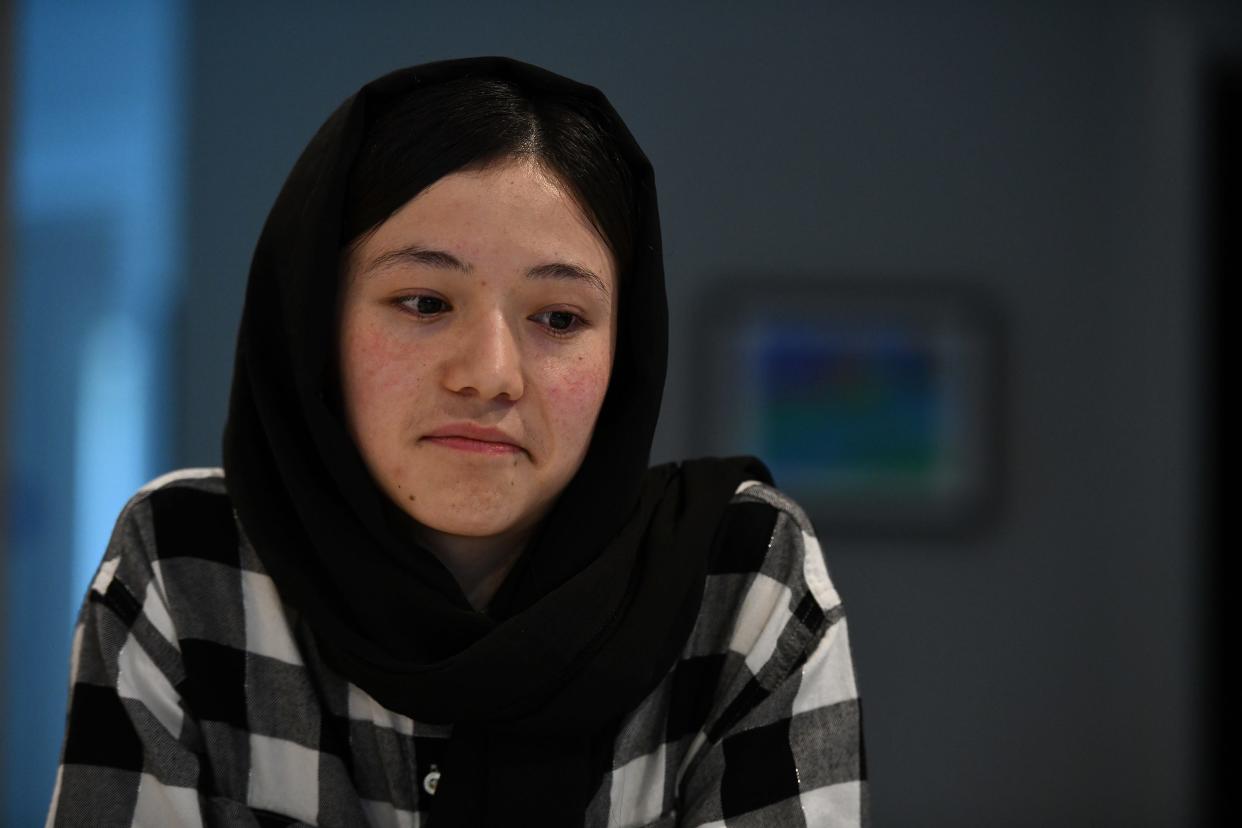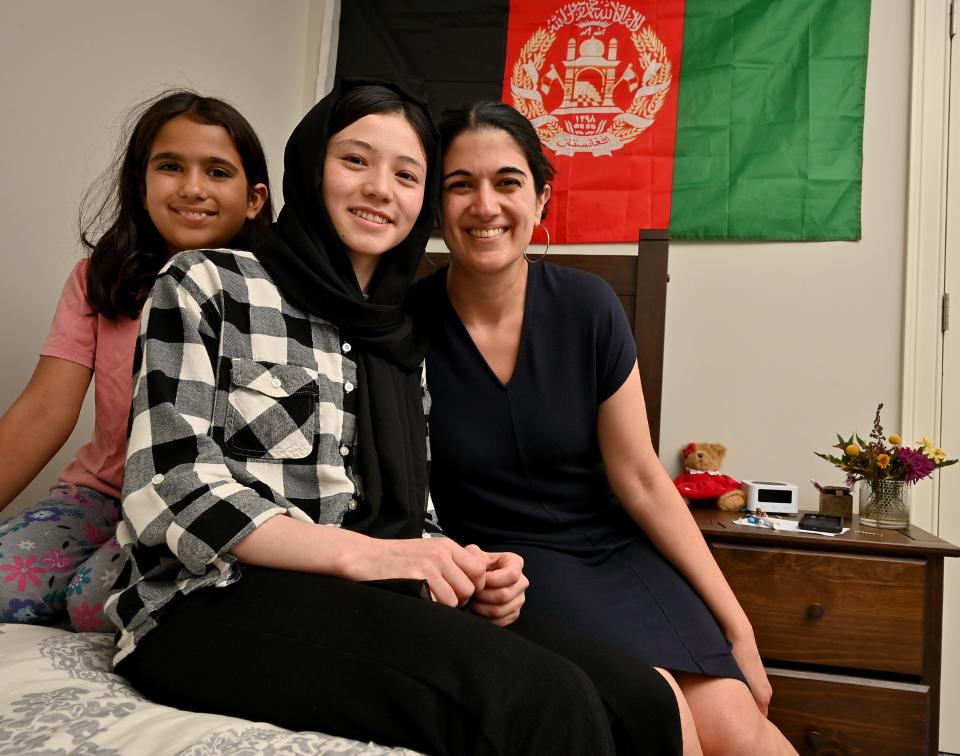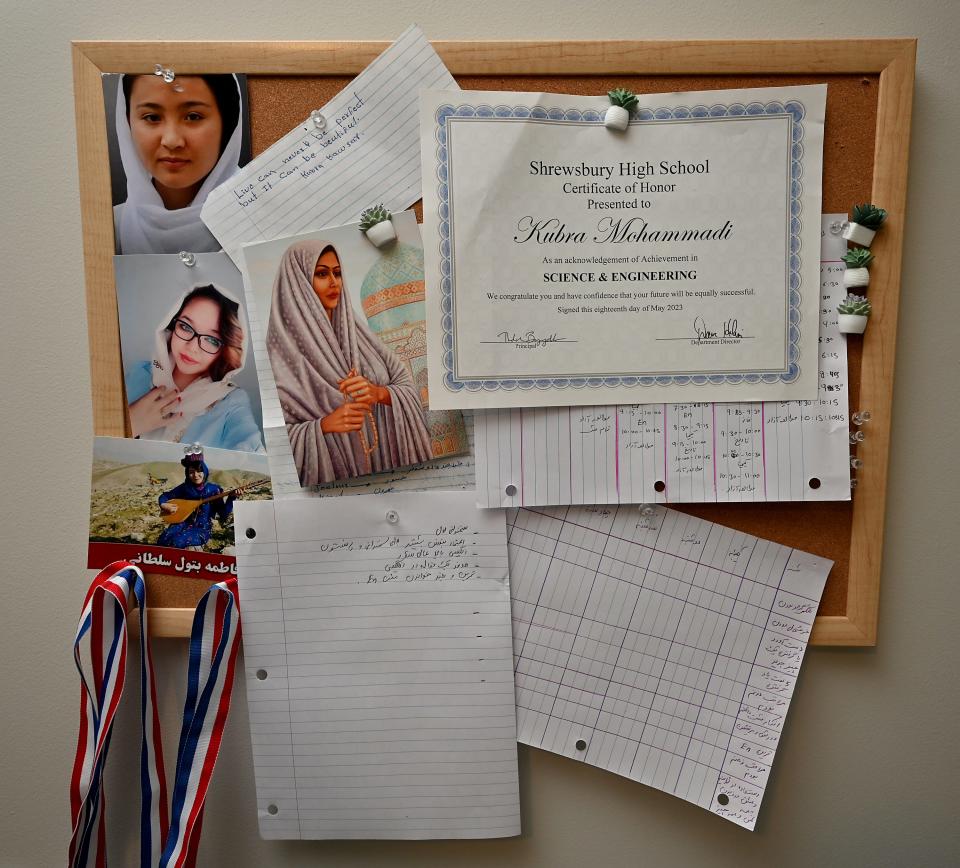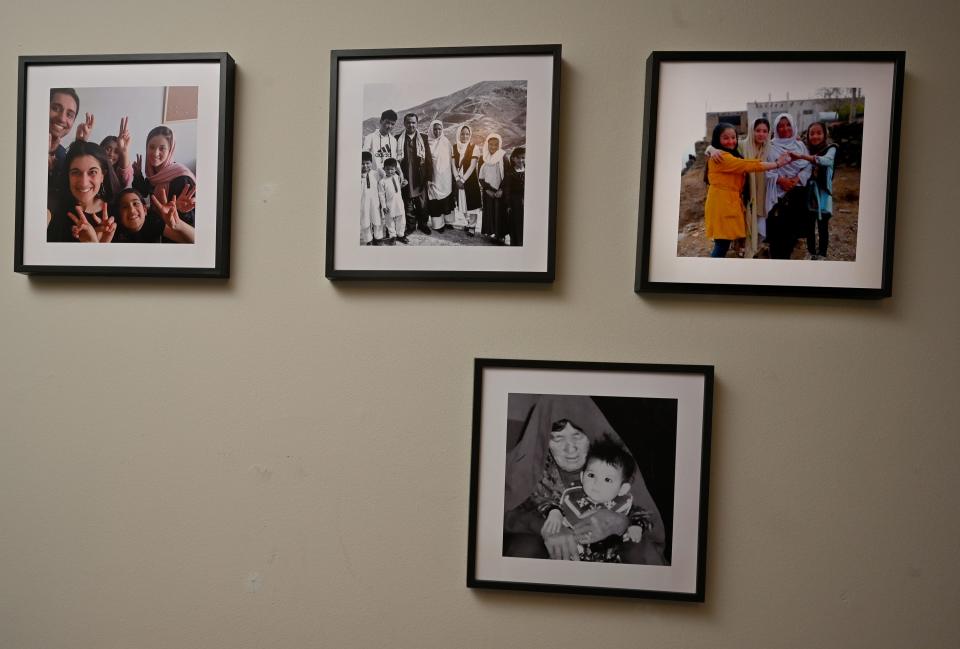2 years after escaping Afghanistan, Shrewsbury teen has her sights set on Harvard

- Oops!Something went wrong.Please try again later.
SHREWSBURY — Kubra Mohammadi is the Taliban’s worst nightmare: an educated woman who uses her voice to speak out against their oppressive regime and for the rights of other girls and women.
A junior at Shrewsbury High School, Mohammadi, 19, uses whatever platform she can to speak up against the Taliban and advocate for equal rights in her native Afghanistan, including a national speech and debate competition in May.
“It was not for me, it was for my friends and classmates in Afghanistan that cannot do it for themselves,” Mohammadi said. “I raised their voice and that trophy is for them.”
Despite having only learned English in the last couple of years, Mohammadi finished fourth out of the thousands of other students from across the country who competed at the National Catholic Forensic League Grand National Tournament in Louisville, Kentucky.
“When Kubra made it to the final round, the entire team felt that she could not lose and was destined to be the national champion,” said Marc Rischitelli, who has been head coach of the speech and debate team at Shrewsbury High School the last 25 years, and involved with the team for 35 years.
While she may not have placed first, Mohammadi accomplished what she set out to do: speak about the oppression of women and girls in Afghanistan, share details of her life story and call for action worldwide, in just 10 minutes.
It wasn’t the first time Mohammadi had spoken about these topics, and it won’t be the last. She has hopes of becoming a globetrotting conflict journalist who tells the stories of women and girls whose voices are being stifled by oppressive regimes.
Her life experiences helped shape those ambitions, and continue to push her to achieve her dreams.

A childhood in Afghanistan
Born in Ghazni, a city in Afghanistan southwest of Kabul, Mohammadi and her family moved to the capital when she was 10, seeking better educational opportunities.
Her family had instilled in her the value of education, gifting her books that helped develop a love of reading and writing.
While there were more educational opportunities for Mohammadi and her siblings in Kabul, there was also danger.
She was vulnerable not only as a girl pursuing education but also because she is Hazara, a member of an ethnic group in that has historically been targeted by Taliban violence.
“When the Taliban took over the first time, they killed a lot of Hazara people,” Mohammadi said. “When they took over again, people were scared they might kill again.”
As the Taliban began to take over the country again, schools became targets for attacks.
When she was 16, Mohammadi's school was targeted by a suicide bombing attack. The explosion killed nearly 30 people and injured almost 60, including one of her best friends, who later died from injuries she sustained during the attack.
“It's a really hard thing, like you lost your brain,” Mohammadi said.
She managed to push through by holding onto her dreams, as well as the dreams of her best friends.
Reuters reported that the Islamic State, which for years has battled the Taliban for influence in Afghanistan, claimed credit for the attack.
Escape from Kabul
When the Taliban took over the country again on Aug. 15, 2021, Mohammadi was studying in the library.
“I used to live in the library, to study, or sometimes help people,” she said. “My mom called me that the Taliban took over Kabul, so I went home and everything was closed.”
The school she was attending, like other girls' schools, was closed.
Over the next few days, she learned that former Afghan President Ashraf Ghani had fled the country, and that U.S. troops were at the airport helping people evacuate.
On Aug. 19, Mohammadi and five boys got a ride to the airport from her cousin, with hopes of making it to another country, such as Iran, Pakistan or the United States.
Mohammadi did not want to say goodbye to her family, so she she told them that she might return. She did not.
“I am the first girl in my family to go to school,” she said. “I wanted to continue my education.”
When she got the airport she learned that only women were being allowed through to get on planes, meaning that she was the only one from her group allowed to board. She didn't have a phone with her, so she had to use the airport phone to call her family and let them know she had made it to the airport and might be traveling to the United States.
For the next two days, Mohammadi sat at the airport with no food, waiting to find out where she would go next.
She, and hundreds of others looking to get out of Afghanistan, boarded a military plane with no seats and flew to Qatar, sitting side by side on the floor.
From there they were taken to Germany the day after, and the United States two days after that.
The next time she spoke to her family was after arriving in the United States, using a phone she had borrowed from someone else to let them know she arrived.
Her parents were happy and relieved, she said, since there was "nothing left for her in Afghanistan" and she could continue going to school. But the phone call was also bittersweet, because the family had no way of knowing if they would ever see each other again.
Mohammadi lived in a camp in New Jersey for a few months after arriving.
Coming to Massachusetts
Eventually, she was placed in a shelter in New York, where she lived until she was placed in the care of Sanam and Navid Zaer, who live in Shrewsbury.
Sanam, a teacher and who grew up in Central Massachusetts, and her husband, a physician who was born in India but moved to the United States as a teenager, are not new to being foster parents. They had welcomed a foster daughter before.

But the process to make sure Mohammadi would end up in their care was a unique one, Sanam Zaer said.
The couple were planning to travel to Florida for a wedding when they received the call from Ascentria Care Alliance in Worcester, where they were licensed as foster parents, about taking Mohammadi.
The organization has an unaccompanied refugee minors program, which provides foster care to youth escaping dangerous circumstances in their home countries, while also providing licensing of foster parents for unaccompanied refugee minors through a contract with the Massachusetts Department of Children and Families.
"We learned about this program, and it was just a really good fit for us," Zaer said.
Zaer said the couple didn’t want Mohammadi to arrive, just for them to leave for Florida. They checked to see if she could come after they returned, but Mohammadi was a week away from turning 18, which would have changed her placement process entirely.
"She would have had to go into independent living, get a job to support herself, live in an apartment, go to school ‒ probably at night," Zaer said. "Her path would have been very different."
Ascentria Care Alliance looks to resettle older teenagers, Zaer said, to help ensure that they do not have to go through independent living or be returned to their home countries after turning 18.
By being placed before they become legal adults, refugee minors like Mohammadi can live with a family while focusing on things like education and extracurricular activities; work is voluntary.
The couple scrambled to make sure they could get Mohammadi in their home before she turned 18, and were able to find a friend who could stay with her until they returned from their trip.
Making a new life in Shrewsbury
Since moving in with Zaer and her husband, Mohammadi has enrolled at Shrewsbury High School, where she is an honor student.
She taught herself English, using books and videos, and has grown to love reading the news and books about politics. She often reads The New York Times or the BBC. Her favorite book is "Becoming" by Michelle Obama.
She has grown close with both of Zaer’s biological children and has found new hobbies and interests, like practicing piano and playing board games.
In her room, she has her trophies near her desk, and a shelf lined with books that have helped her learn English. On her wall hang photos of her family she received through messages and had printed out. Over her bed is the Afghan flag.
Mohammadi has also made sure to have fun, like dressing up as a clown with the rest of the speech and debate team not long after she first joined.
“She recognizes that joy, in and of itself, is not just important for survival, but is also an act of protest to a world that tries so hard to weigh us down,” Zaer said.
Zaer, whose mother came to the United States as a refugee from Iran, said she and Mohammadi have bonded over their cultural similarities and differences, creating an almost aunt-niece relationship.
“The reason we foster is because we come from immigrant and refugee families and know that these kids just need a safe home and an opportunity to build a life for themselves,” Zaer said. “It has been a very beneficial experience for our family as well to build lifelong relationships with youth from around the world.”
She hopes people are encouraged to become foster parents, especially families with diverse backgrounds.
Mohammadi has flourished in school, becoming a friendly and welcoming presence for other English learners who have recently arrived, said Melissa Nattinville, a teacher who has worked with Mohammadi.
“She has made rapid progress with regard to her English acquisition,” she said. “In all of her courses, she is extremely diligent and driven to succeed.”
Roseanne Cataldo-Enriquez, another teacher at Shrewsbury High, said Mohammadi has shared her story with classmates, helping them get a wider understanding of the world around them, and leaving them “awestruck.”
“She once shared in class that the way she copes with harrowing moments is by waking up each day and setting an intention for herself, using positive affirmations to visualize the successful achievement of her goals,” Cataldo-Enriquez said.

She hasn't forgotten her home country
While she is safe from violence in Zaer’s home, others in Afghanistan are not.
Many of her friends are in Afghanistan, and when she gets to speak with them, they cry because they feel as though their dreams have been taken away, Mohammadi said.
During a different speech and debate competition earlier in the school year, Mohammadi learned just before she was scheduled to compete that a bomb targeting Hazara people had gone off near where her family lived.
She could not get in touch with them for a long time and feared the worst. She later learned her family was safe, but not before she had to compete and push through her worries to give her speech.
Recently, her parents, as well as her siblings, have been able to move to the United States as part of a reunification process that began when Mohammadi got on the plane in Kabul as an unaccompanied minor.
They settled in Virginia. While Mohammadi hasn’t had the opportunity to see them yet, she plans to this summer.
She is excited, she said, since she hasn’t seen most of her family in about two years, and hasn’t seen her dad in five or six.
He worked in different Arab countries, and because of COVID-19 travel restrictions, as well as financial restraints, he had not been home in years by the time Mohammadi left Afghanistan.
While Mohammadi will be happy to visit her parents, she wants to stay in Massachusetts to finish high school and attend college. She has set her sights on Harvard University.
This summer Mohammadi will be one of a handful of students chosen to participate in a journalism program hosted by Princeton University that aims to help first-generation college students and students from diverse backgrounds.
It is a hybrid program, mixing online workshops with on campus lectures and networking opportunities with leaders from the journalism industry. It’s a good start to what Mohammadi hopes is a long career in journalism.
Cataldo-Enriquez agreed to be one of Mohammadi’s references for the program at Princeton.
“There was no doubt in my mind that it was something that needed to be done,” Cataldo-Enriquez said. “I can say with utmost confidence that she will make the most of this opportunity, and every other door that opens for her along her path.”
And while she wraps the school year and prepares to enter her senior year in the fall, Mohammadi said, she will continue to advocate for women and girls in Afghanistan when given the chance.
She had one final message she wanted to share:
“Open schools and universities for girls and women in Afghanistan.”
This article originally appeared on Telegram & Gazette: Afghan refugee Kubra Mohammadi thriving at Shrewsbury High School

